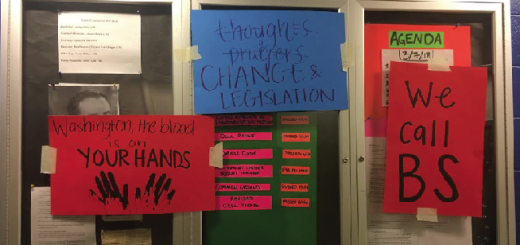Senator Maggie Hassan Talks Guns and Civic Engagement at HHS Visit
Guns were the topic of the day at U.S. Senator Maggie Hassan’s visit to Hanover High on Tuesday. In fact, the debate over firearm laws at HHS in particular is the reason the senator came to the school in the first place.
Hassan, who has served as the junior senator for New Hampshire in the United States Senate since winning election in 2016, spoke for an hour with an audience of students and staff in the crowded HHS auditorium about the issues of gun control, youth civic engagement, and the way they two have become intertwined. As she explained at the beginning of her speech, the senator had been invited to discuss gun laws at Hanover High by junior Ella Chapman following a string of notorious school shootings across the United States earlier this year.
The senator leapt right into gun control after a short preface, declaring, “No student should have to fear for their lives when they are attending school.” Hassan voiced her dismay with idleness in Congress when it came to acting in response to the recent series of school shootings, particularly those at Marjory Stoneman Douglas High School in Parkland, FL, and in Santa Fe, TX. If she had her way, “you would not have needed to be marching,” Hassan said, referring to the student-led rally against gun violence held at HHS last March. She continued, “But you have needed to march…you have needed to speak out.”
Hassan then proceeded to call for what she saw as “common sense reforms” to gun laws with bi-partisan support: more thorough background checks for those hoping to purchase firearms, the closing of loopholes allowing domestic abusers access to guns, and the introduction of a “red flag law” to take guns away from whose mental health situation made their possession of a firearm dangerous. “In this case, on this issue…we need to keep people who shouldn’t have guns from having them,” the senator stated.
The senator frequently repeated her call for increased civic engagement among students throughout her talk. Hassan extolled New Hampshire as a place where citizens could easily get involved in politics, saying, “New Hampshire really does democracy better than anywhere else” and pointing to the large size of the NH legislature in relation to the state’s population as evidence. She called on students to get involved in politics not only at the national level but at the state and local levels as well. On the subject of student participation in the debate over gun laws, Hassan said, “The fact that you are all speaking out makes a tremendous difference.”
After Hassan finished her speech, the floor was opened to questions from students. One student asked the senator how she planned to motivate the Democratic base and political moderates to take action on gun control. While she did not answer the question directly, she called on the student to let candidates running for other offices know their position on gun laws and to “engage with people [they] haven’t spoken to in their community… to find out what other people think.” She conveyed that she valued New Hampshirites’ Second Amendment rights but that she does feel “an obligation to take common sense reforms to limit guns of war.”
Junior Briget van Gemeren later posed a question to the senator about the ethics of taking guns away from people with mental illness and at what point the government should be permitted to take that sort of action. Hassan opened her response by saying, “We want to make sure we’re focusing on behavior, not diagnosis.” She explained that law enforcement would like for warning signs such threats of harms made on sites such as Facebook. The senator added that she wanted people who had their guns taken would have chances to challenge and appeal government seizures and to allow room for a “case-by-case analysis.” She emphasized that she hoped firearms seizures would take place only when individuals’ behavior”signifies that they will become violent.”
Oliver Minshall, a junior, proceeded to press the senator on the question how she (a Democrat) would work with the Republican Party when, in Minshall’s eyes, many Republican legislators did not want to compromise on the issue of gun control. Minshall, who identified himself as a Democrat, brought up the failure of a bipartisan deal expanding background checks created by Senators Joe Manchin (D-WV) and Pat Toomey (R-PA) to pass in Congress as an example.
Hassan said that she lamented the failure of the Manchin-Toomey bill and pinned the lack of openness to compromise on the growing partisan divide in the United States. In turn, she blamed the re-drawing of states’ congressional districts to favor particular political parties (the process known as gerrymandering) as being a source of this division. She seemed optimistic about the spirit of compromise in New Hampshire (a known swing state) when referring back to bipartisan Medicaid deals passed during her time as governor. She also mentioned that the outcomes of state primary elections in 2018 would serve as key indicators in pointing out the spread or decline of political polarization.
Hassan then took a question from a sophomore about her feelings on concealed carry laws. The senator voiced an opposition to concealed carry without a permit; she recounted that she vetoed two bills which would have allowed such a practice during her time as New Hampshire governor (the practice has since been made legal by her successor, current Governor Chris Sununu). Hassan said that “you have to be trained and you have to understand what you’re doing” in order to use concealed carry responsibly. She used to topic to segue into the debate about arming teachers, saying that many of the educators who had spoken to her did not wish to have a firearm in the classroom.
Next up was junior Eamon Worden, who inquired to the senator whether it would be feasible to ban assault weapons such as the AR-20. Hassan voiced opposition to the availability for purchase of the types of firearms she called “weapons of war.”
The conversation took a sharp turn when another junior began to ask Hassan about her thoughts on the federal investigation into whether the Russian government interfered with elections across the United States in 2016. “It is very clear that Russia interfered with our elections,” Hassan said, then citing a statement made by other members of Congress alleging Russian support for US President Donald Trump’s candidacy. She also said that it was important that Congress “protect” special counsel Robert Mueller and Deputy Attorney General Rod Rosenstein, two leading officials in the investigation.
Hassan left at 3:00pm after taking a few more questions.
Ella Chapman, the student who had asked Hassan to speak in Hanover after speaking with the senator personally in her Washington, DC, office, seemed pleased with the way the visit went. She and junior Mason Winter, who were both involved in HHS’s walkout in March, said that they organized the senator’s visit because they “wanted to to keep the momentum going after the walkout.”



